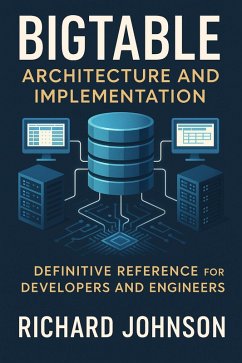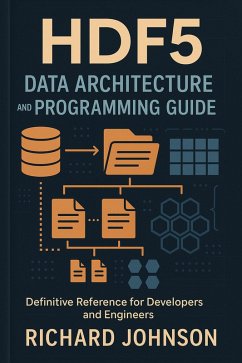
Reliability and Architecture of HDFS (eBook, ePUB)
Definitive Reference for Developers and Engineers

PAYBACK Punkte
0 °P sammeln!
"Reliability and Architecture of HDFS" "Reliability and Architecture of HDFS" offers a comprehensive exploration into the design principles, architectural components, and resilience strategies underpinning the Hadoop Distributed File System (HDFS). Beginning with the foundational motivations and challenges of building reliable distributed systems, the book provides invaluable context by situating HDFS within the broader landscape of big data technologies. Readers will gain a deep understanding of core architectural elements such as the NameNode, DataNode, and the sophisticated mechanisms manag...
"Reliability and Architecture of HDFS" "Reliability and Architecture of HDFS" offers a comprehensive exploration into the design principles, architectural components, and resilience strategies underpinning the Hadoop Distributed File System (HDFS). Beginning with the foundational motivations and challenges of building reliable distributed systems, the book provides invaluable context by situating HDFS within the broader landscape of big data technologies. Readers will gain a deep understanding of core architectural elements such as the NameNode, DataNode, and the sophisticated mechanisms managing metadata, block distribution, and client interactions-all carefully engineered to maximize reliability, fault tolerance, and performance. Through detailed examination of HDFS's reliability mechanisms-ranging from block replication, rack-awareness, and data integrity checks to advanced high availability (HA) deployments-the book illustrates how HDFS achieves robust safeguards against hardware failures and data loss. It delves into modern enhancements such as erasure coding, in-memory storage, geo-replication, and cloud integration, highlighting how these features contribute to both storage efficiency and operational resilience in hybrid and large-scale environments. Underpinning these technical strategies, the book also addresses mission-critical topics including consistency models, atomicity, resource management, and security frameworks, encompassing authentication, authorization, encryption, and threat mitigation. Designed for data engineers, architects, system operators, and researchers, this resource goes beyond theoretical exposition by offering best practices for operational reliability, automation, failure analysis, and continuous testing. The closing chapters peer into the future of distributed storage, reviewing emerging research directions like self-healing architectures, novel data protection schemes, and seamless integration with analytics and AI workloads. With practical insights, up-to-date methodologies, and an eye on evolving industry needs, "Reliability and Architecture of HDFS" stands as an indispensable reference for building, maintaining, and innovating upon highly dependable large-scale storage infrastructures.
Dieser Download kann aus rechtlichen Gründen nur mit Rechnungsadresse in A, B, BG, CY, CZ, D, DK, EW, E, FIN, F, GR, H, IRL, I, LT, L, LR, M, NL, PL, P, R, S, SLO, SK ausgeliefert werden.












